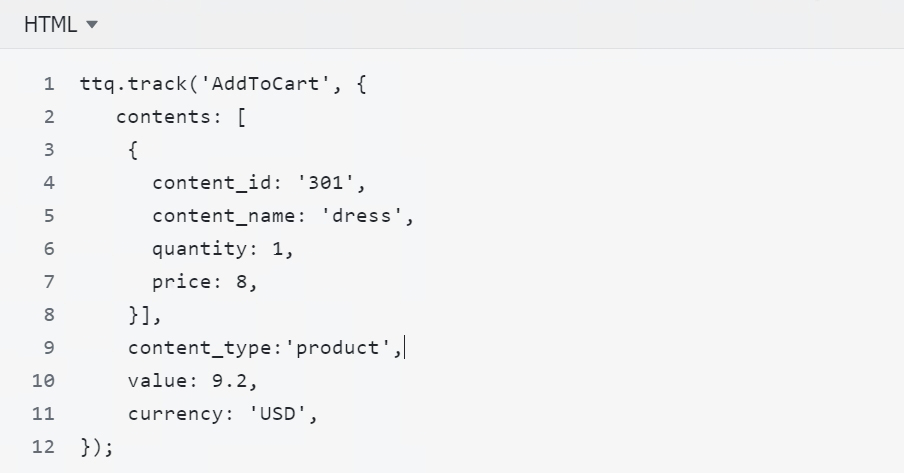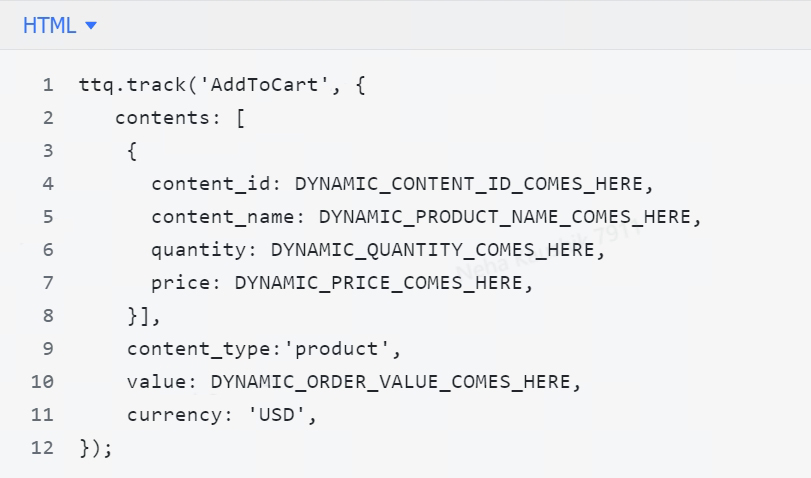About Parameters
Parameters are properties that can be paired with any event to impact campaign performance. Certain parameters are required, while others are highly recommended to improve performance.
Learn more about developer documentation to implement parameters.
Available parameters:
content_type: Value must be set to "product" or "product_group". If you use sku_id as "content_ids" or "contend_id",use "product", if you use item_group_id as "content_ids" or "contend_id", use "product_group". This field is required for Video Shopping Ads (VSA).
contents: A list of content objects that represent relevant products in a web event with product information. The value must be an array of objects. This field is required for Video Shopping Ads (VSA).
content_ids: Unique ID or array of multiple ids of the products or content eg. ['987','654']. You must include the 's' in 'content_ids', whether you send a single id or an array of ids. We recommend using sku_id or item_group_id that matches the sku_id/item_group_id you set up in the catalog, if available. This field is required for Video Shopping Ads (VSA).
delivery_category: You can indicate the delivery method for online purchases using the parameter delivery_category. This parameter helps track purchases by delivery method, such as curbside pickup, in-store pickup, or home delivery.
price and value: The price for a single item, and value is the total price of the order. For example, if you have two items each sold for $10, the price parameter would pass 10 and the value parameter would pass 20. Value type must be a number. This field is required for ROAS and Value-based Optimization (VBO).
quantity: Use to specify the quantity of items at checkout initiation.
content_name: Name of the page,product. Value type must be a string.
content_category: Category of the page/product. Value type must be a string.
currency: ISO 4127 code. The next section contains a list of currently supported currency. Value type must be enum(string). This field is required for ROAS.
search_string: The user-entered string for search, used with the Search event.
description: A string description of the item or page.
status: Status of an order, item, or service. Value type must be a string.
Note: Depending on your use of 'status', Events API may be required in order to share status changes to TikTok.
Currency that is currently supported by TikTok: AED, ARS, AUD, BDT, BHD, BIF, BOB, BRL, CAD, CHF, CLP, CNY, COP, CRC, CZK, DKK, DZD, EGP, EUR, GBP, GTQ, HKD, HNL, HUF, IDR, ILS, INR, ISK, JPY, KES, KHR, KRW, KWD, KZT, MAD, MOP, MXN, MYR, NGN, NIO, NOK, NZD, OMR, PEN, PHP, PKR, PLN, PYG, QAR, RON, RUB, SAR, SEK, SGD, THB, TRY, TWD, UAH, USD, VES, VND, ZAR
You can set up dynamic values which pass dynamic event-related values to TikTok. Check with your website developer to set up dynamic values or use TikTok's self-service Event Builder tool. This dynamic code will automatically determine the correct values of your event, such as the price of purchase, instead of using a set value. You can also use our technical guide to set up dynamic values with code.
For example, if a visitor lands on your website and adds a dress to their cart, the below is what static or set value will look like:

To make these values dynamic, replace set values with code that will pass correct values like 'book' or '10.0' automatically.

